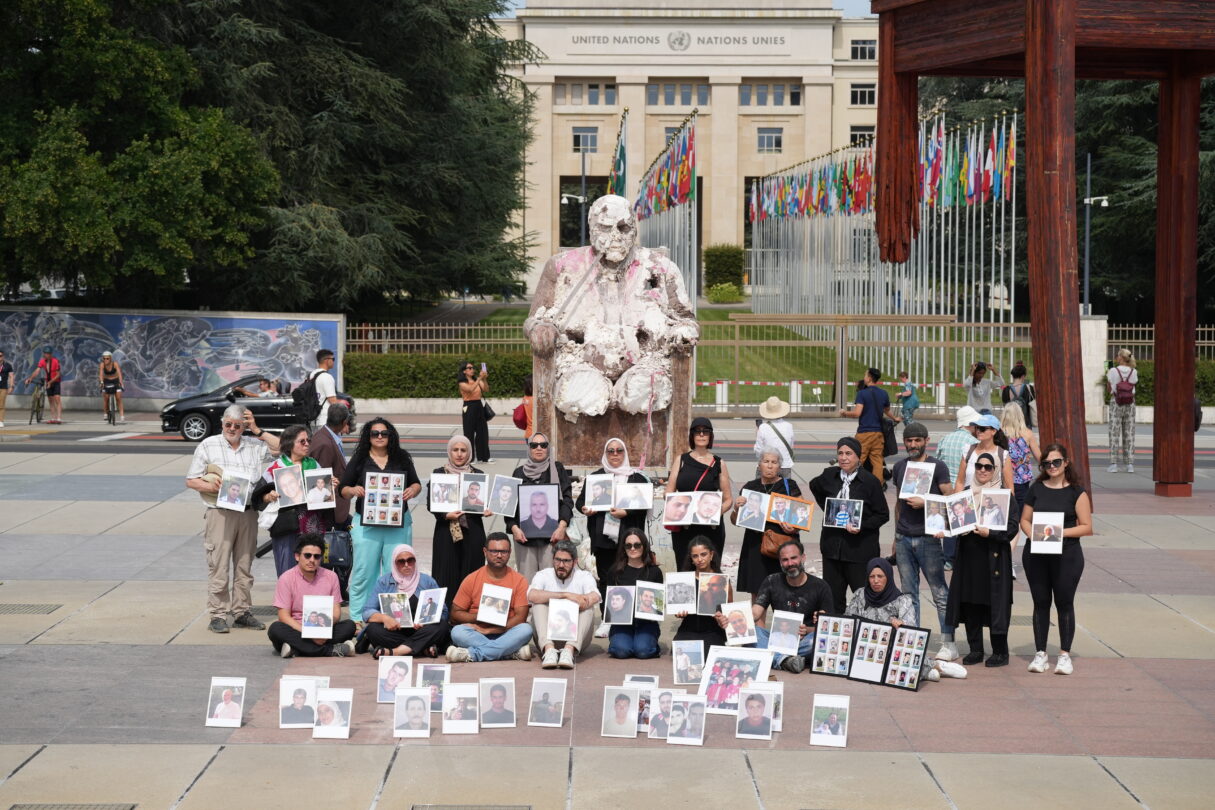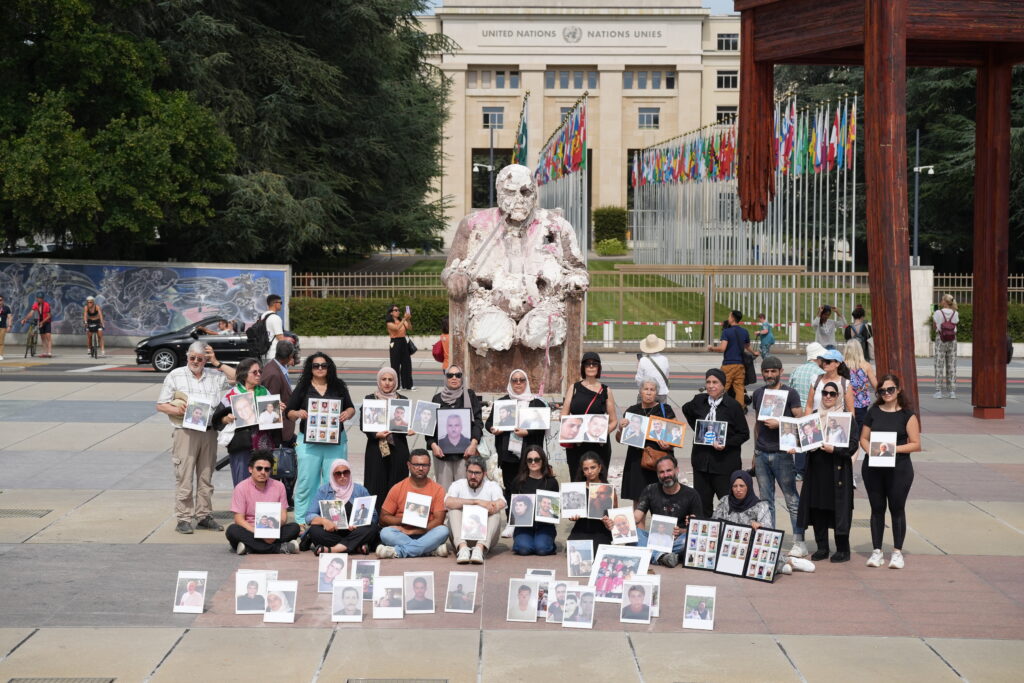Letter from our Executive Director
2024 is the year that changed everything for Syria. It is impossible to reflect on the events of December when the dictatorship lost power after five decades, without analysing the past 14 years and more. But since this is The Syria Campaign’s 2024 annual report, I will focus on the 12 months leading up to this moment.
I will also concentrate on the work of our talented team of creative campaigners and advocates, and the courage and dedication of our partners. The triumph of 2024 of course goes well beyond our network and can be attributed to diverse and divergent communities from across Syria and the diaspora.
However I also believe that our work contributed to the fall of the Assad regime. Our campaigns challenged the normalisation of the regime that just a few weeks before its downfall was being welcomed back into diplomatic circles in the Middle East and some European countries. A war criminal and head of Syria’s Olympic committee was, one can assume, packing his bags for the Paris Games when, alongside the Syrian British Consortium, we exposed his crimes against students at Syrian universities and worked with media to highlight the dangers of welcoming war criminals to the games.
Later in the year, we worked with artist Khaled Dawaa to destroy his statue of a dictator in front of the UN Headquarters in Geneva. It was a symbolic act that no one could have imagined would so quickly be followed by statues of Assad being toppled on the streets of Syria. As Khaled tore apart his art work, families of Syria’s disappeared wrote messages on the plaster base, calling for freedom for their missing loved ones. The performance protest was an effort to capture the attention of decision makers and it worked. They wanted the UN’s mechanism for the missing to get to work and find answers about the fate of 135,000 detainees.
Only a few months later and the prison doors were opened as town after town was liberated from the regime security apparatus which locked them inside horrific dungeons, torturing and arbitrarily detaining political prisoners for years on end.
The pain for so many Syrians, including our own team members, who searched videos on social media for a glimpse of their son, father, sister, friend, was unbearable as the world watched in disbelief at the horrors that were suddenly exposed for all of us to see. The tragedy is that the world has long known of the crimes of the Syrian regime and while European courts and even the highest UN court tried in some ways to end the atrocities, our global systems are broken and impunity reigned for too long.
Looking ahead now, our job is to make sure that justice and accountability is done for every Syrian survivor, for every life lost and every detainee still missing. It is also vital for the global fight against impunity and for the future peace of Syria.
There is a lot to do. Syrian civil society has shown the force of its power. When the White Helmets worked alongside communities in the Northwest to rebuild following the earthquake, when survivors of chemical weapons attacks pushed for a special tribunal on the use of chemical weapons by any state, or award-winning filmmaker Waad Al-Kateeb briefed the Security Council they were not just pushing back against the tyranny of the regime, it was demonstrating to every one of us that there is a vibrant dynamic civic community ready to hold any government in Syria to account, expose the truth and demand their rights during this pivotal moment.
The next transitional period will, and must be, Syrian led, not just by the established groups who have been campaigning for freedom for the past 14 years but by young people who have been silenced by the regime all of their lives. It is their vision that is now free to be expressed and championed and The Syria Campaign will be there to support them.
I sign off our 2024 annual report with my real name, which it was too dangerous to use in previous reports. A lifechanging year in profound ways for so many of us and only the start of all the world-changing opportunities of 2025 and beyond.
Yours sincerely,
Razan Rashidi, Executive Director
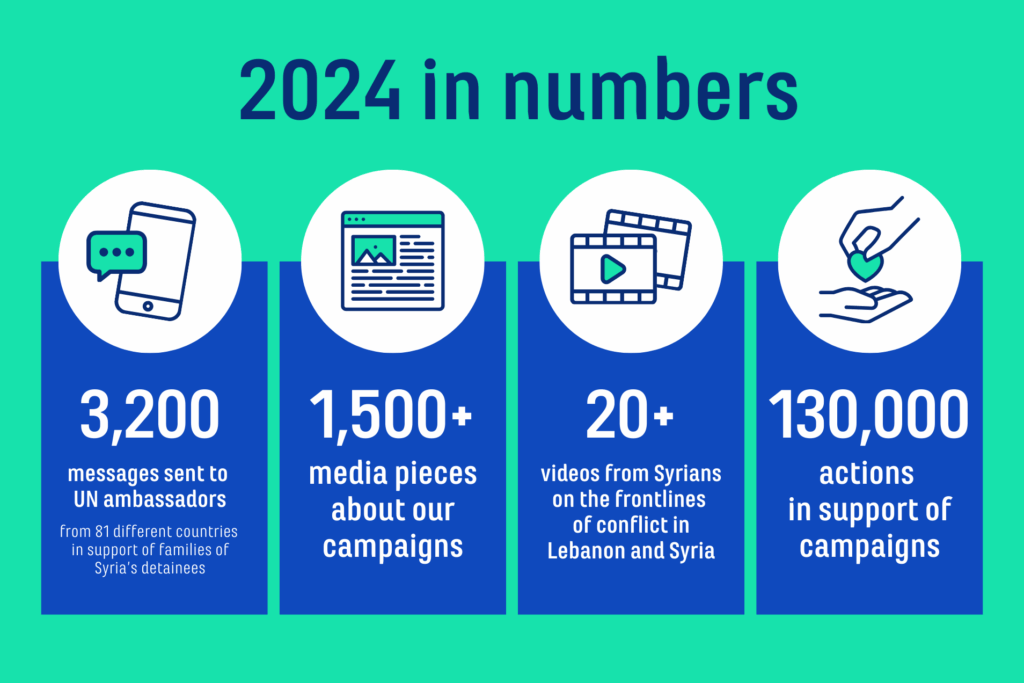
1. Keeping crises in the spotlight
The year started marking one year since a devastating earthquake struck Syria and Türkiye on 6 February 2023. Together with Syrian humanitarian groups, we warned of the worst humanitarian crisis of the past 13 years in northwest Syria where intense bombardment of quake-affected areas, a massive funding shortfall and reduced aid access all combined to make the recovery efforts extremely challenging.
Supporters emailed UK MPs asking them to support the humanitarian response one year on and we worked with international media including The Guardian, BBC and DW to cover the crisis.
In November, the situation in northwest Syria was rapidly deteriorating. Over just three days, the White Helmets responded to more than 75 attacks by regime and Russian forces, which hit civilian infrastructure, including markets, schools, and homes. In response to the escalating violence, we raised the alarm through media and social media updates.
2. Honouring Syria’s women
On the 13th anniversary of the Syrian revolution, we collaborated with Syrian illustrator Dima Nashawi to create an artwork celebrating the invaluable contributions of Syrian women in the struggle for freedom and democracy. The social media campaign, which depicted the diverse roles of women in the revolution, reached more than 40,000 people globally.
Our support to women-led organisation Mazaya working to train and equip women in northern Syria had a powerful impact when the challenges they faced were immense. The community and practical support, including vocational training courses, first aid training and psychosocial support sessions, they provide to women has laid strong foundations for the coming phase in Syria’s transition.
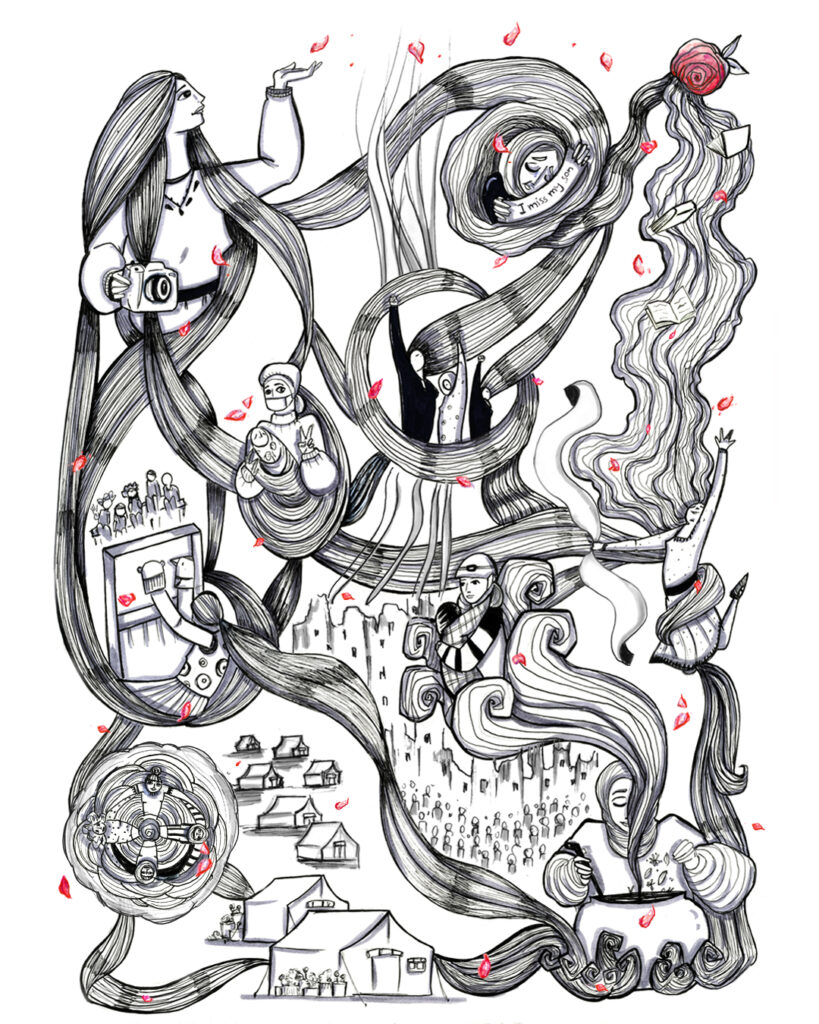
3. Challenging impunity for chemical weapon attacks
In April, seven years after Assad’s regime killed 91 people, including 32 children, in a chemical attack on Khan Sheikhoun in northwest Syria, we joined survivors of chemical attacks, the White Helmets and other groups to urge governments around the world to create a new international tribunal to prosecute perpetrators of chemical attacks – to overcome Russia and China’s repeated vetoing of existing routes to justice through the UN.
The petition was shared in six languages, including Japanese and has garnered 10,000 signatures. Messages from survivors shared the campaign on social media and we supported chemical weapon survivor Ameenah Sawwan to speak at the Brussels conference’s side event on “Charting a Path to Justice: Syrian Civil Society and Accountability for Chemical Weapons Use” with her message reaching more than 70,000 people.
Later in the year, in November, a conference brought together survivors, civil society and state representatives. A letter to the states exploring proposals for a tribunal from 50 Syrian organizations highlighted that justice for chemical weapon attacks is not just about holding criminal regimes and individuals to account — it is about helping survivors heal and preventing future atrocities.
The same month, we wrote a letter, signed by 39 Syrian organizations and survivors’ groups and human rights advocates, urging OPCW member states to oppose Russia’s candidacy for the OPCW Executive Council. The letter outlined that voting for Russia — a state that has shielded perpetrators and obstructed accountability — would further silence Syrian victims of chemical attacks, dismissing their suffering and demand for genuine justice. Russia has blocked accountability efforts using its veto power in the UN Security Council 18 times, six of these vetoes were used explicitly to prevent holding the Syrian regime accountable for the use of chemical weapons, a finding made by the OPCW itself. Pressure worked and Russia was not given a seat on the council.
4. A prophetic performance protest
In August, renowned Syrian artist Khaled Dawwa destroyed his own sculpture in front of the UN Headquarters, alongside families of Syria’s disappeared as a performance protest to remind the UN member states of the urgent need for swift action to seek justice and uncover the truth. Dawwa broke up his three-metre tall sculpture of a dictator ‘the King of Holes’ piece by piece as family members surrounded the decaying figure.

The art performance, which took place just over a year after the United Nations General Assembly approved the establishment of the Independent Institution on Missing Persons in Syria, was an important reminder that the historic resolution must act for the missing.
More than 30 media pieces, including a video on NPR viewed 1.3 million times, covered the performance, while our supporters sent more than 3,200 messages to UN ambassadors from 81 different countries in support of the families. The performance caught the attention of policymakers on the ground and online.
On the same day in Syria the White Helmets organised a public art exhibition and memorials to remember those who are disappeared.
5. Ceasefire Now
When Israel bombed civilians, including Syrian refugees, in Lebanon and Gaza, we called for an immediate ceasefire. Just as we acted in response to the bombing of hospitals and schools in Idlib, we responded too when war crimes were being committed with impunity elsewhere. Our petition calling on UN member states to ensure an immediate ceasefire, an end to arms sales to Israel, and protection of civilians in the region in coordination with change.org gained more than 89,000 signatures.
Our campaign video, a message from Syrian Lebanese activist Sarah Hunaidi, from outside the UN on the last day of UNGA received more than 91,000 views and helped power the campaign globally. In Geneva, feminist activist and head of Women Now for Development Lubna Kanawati took our demands to the UN headquarters and an advocacy brief in English and Arabic was shared with policymakers at Geneva Peace Week, Doha conference, and UK MPs as part of a public action by more than 800 of our supporters who directly reached out to their representatives urging them to act and stop arming Israel.
The stories of Syrian refugees in Lebanon reached tens of thousands of people on social media and highlighted the exclusion and harassment of Syrians by Lebanese authorities as the bombs fell.
After months of attacks, a ceasefire was announced on 27 November, showing the power of advocacy and the vital need for public campaigns to continue to raise awareness, amplify voices of those most affected, keeping the pressure on policymakers to act. Our team also worked with media outlets to ensure Syrian refugees’ experiences and voices were included in international coverage of the bombardment.
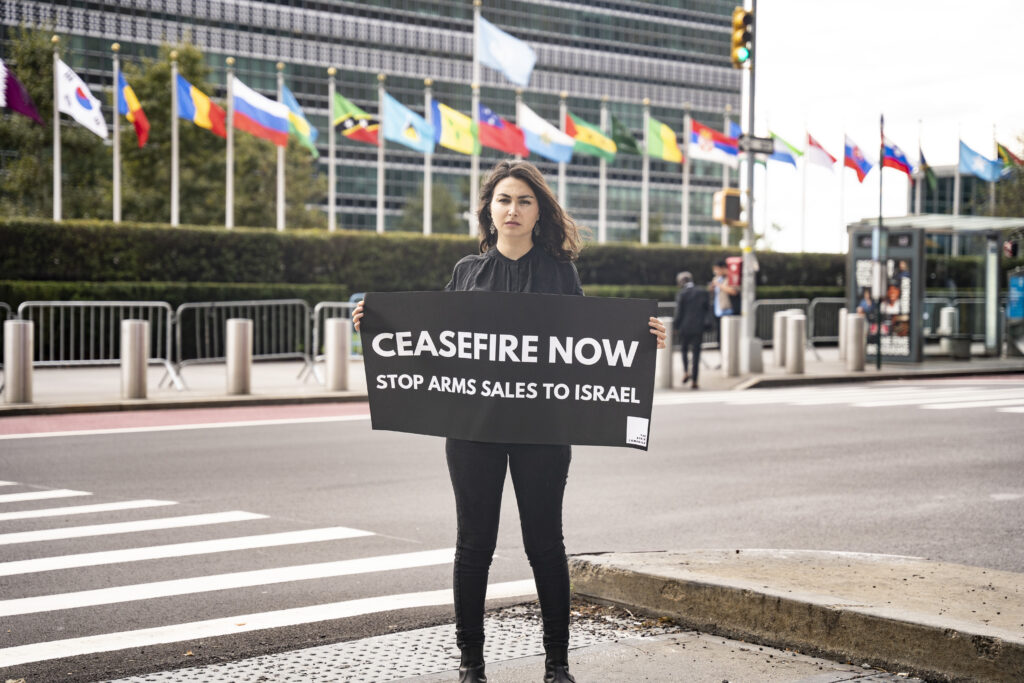
6. Raising refugee rights
When it was revealed that the EU was working to appoint a special envoy for Syria for the first time since 2011 and establish so-called ‘safe zones’ in Syria in an effort to force refugees to return to the torture state and when the EU supported deportation facilities inside Turkey, we helped more than 2,400 of our supporters to raise the alarm and write to the EU commission.
Even though European courts, human rights groups and the UN clearly ruled that no part of Syria is safe for refugees to return to, the efforts of a coalition of states threatened to put lives in danger and send a dangerous signal to all war criminals that impunity reigns.
When a movement of people said to the EU that Syria is not safe, they stood up for global human rights and justice. Alongside collective action, a digital campaign underlined the stories and messages from refugees.

7. Ban war criminals from the Olympics
In June, we worked with the Syrian British Consortium to reveal how the Syrian regime used the National Union of Syrian Students (NUSS) in its brutal crackdown against civilians. SBC’s multi-year investigation exposed how NUSS members orchestrated torture, murder, arbitrary detention and gender-based violence, causing trauma and shattering educational dreams of so many.
The campaign called for justice for the perpetrators of attacks and also asked the Olympic Committee to ban a key member of the NUSS from the Olympic games. Omar Aroub was a senior member of the National Union of Syrian Students (NUSS) leadership during the start of the revolution when he oversaw NUSS violations, providing them with weapons and instructing them to throw regime-opposing students out of dormitory windows. At the time of the Paris games, he was also Syria’s Vice President of the General Sports Federation and Chairman of the Syrian Paralympic Committee.
2024 income and expenses
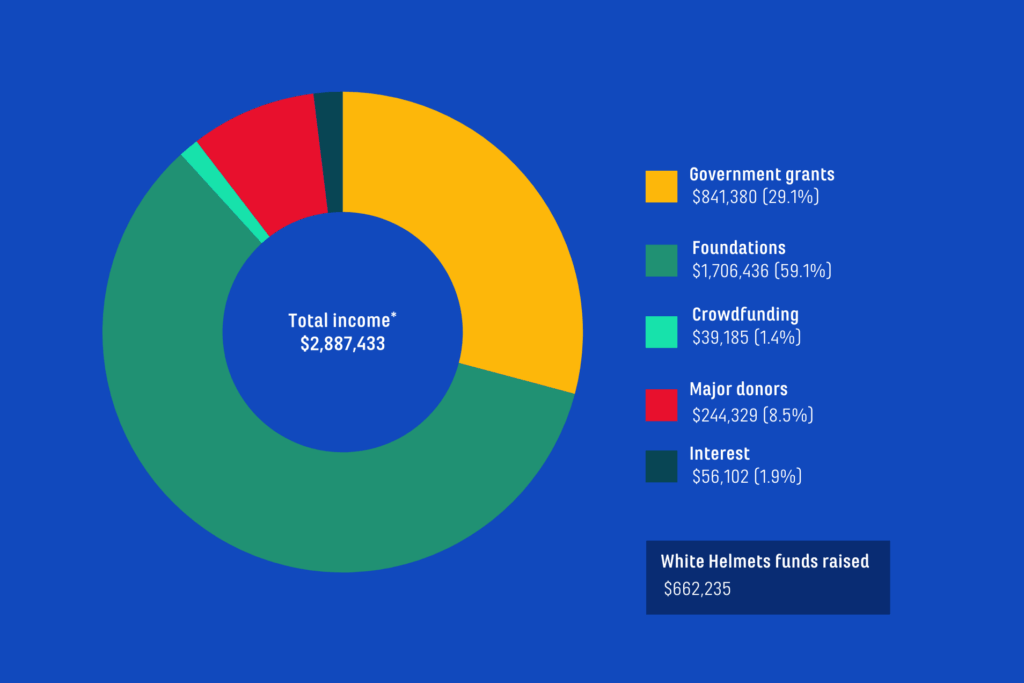
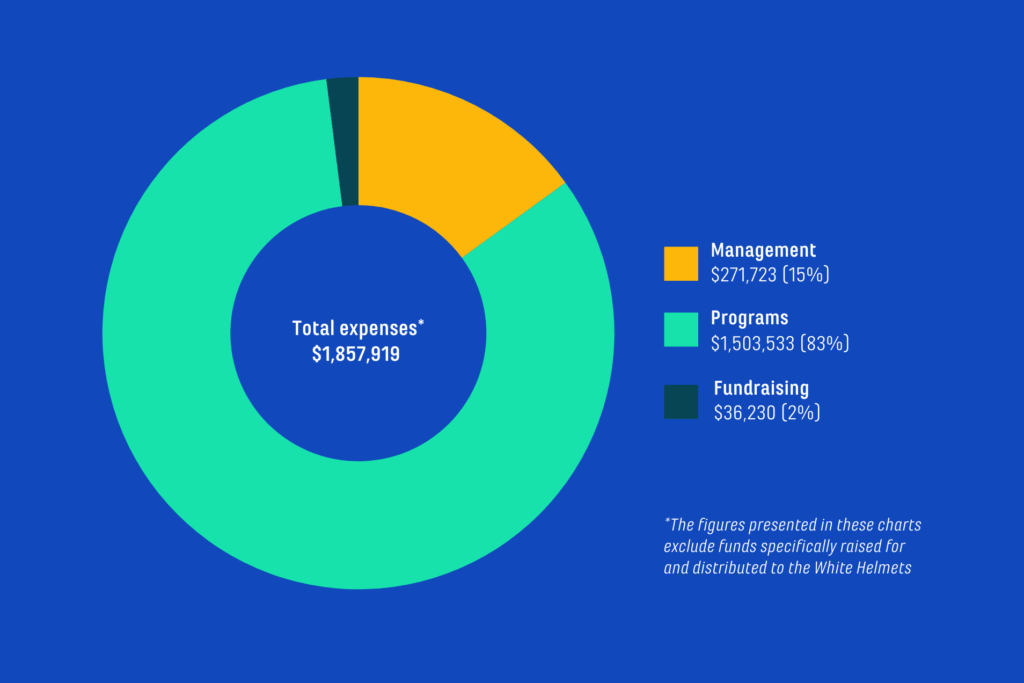
Thank you
Thank you to Rockefeller Brothers Fund, Oak Foundation, Open Society Foundation (OSF), Bureau of Democracy, Human Rights, and Labor (DRL), Dutch Ministry of Foreign Affairs, National Endowment for Democracy (NED), Global Fund for Women (GFW), Women’s International League for Peace and Freedom (WILPF), European Media and Information Fund (EMIF), International Media Service (IMS), Luminate Strategic Initiatives, Friedrich-Ebert-Stiftung (FES), Asfari Foundation, and Minderoo. Their partnership, support and trust have been vital in sustaining our work during this historic year for Syria.
